[ESP-ENG] MOVIE MONDAY 3: Okami Kodomo no Ame to Yuki
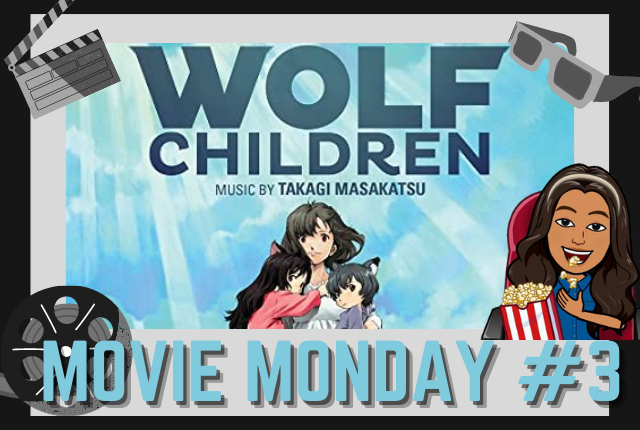
🤗 | ¡Hola, hola, Hivers! | Hi, hello, Hivers! | 🤗
Bienvenidos a la tercera edición de “Lunes de película”, primero que todo y antes que nada, muchas gracias por el apoyo.
Cada vez me esfuerzo más para mostrar cuán agradecida estoy por el apoyo que he recibido antes.
Hoy seguí la recomendación de @marysenpai, tenía razón en que me gustaría esta película, ¡así que muchísimas gracias!
Antes de comenzar, quisiera recordar que no soy experta en cine, animación o música, sólo disfruto las películas como espectadora y comparto mi opinión con ustedes.
⚠️Sin spoilers.
Sólo cuento la película.⚠️
Welcome to the third edition of "Movie Mondays", first of all and before anything else, thank you so much for the support.
I'm trying harder and harder to show you how grateful I am for the support I've received in the first two parts.
Today I followed @marysenpai's recommendation, she was definitely right that I would like this movie, so thank you so much!
Before I start, I would like to remind you that I am not an expert in film, animation or music, I just enjoy movies as a viewer and share my opinion with you.
⚠️No spoilers.
I just tell about the movie.⚠️

📌 | Sobre la película | About the movie | 📌
Dirección: Mamoru Hosoda
Guión: Satoko Okudera y Mamoru Hosoda
Género: Animación, Fantasía y Drama
Estudio: Studio Chizu y Madhouse
País: Japón
Idioma: Japonés
Duración: 117 min
Estreno: 21 de Julio de 2012
Cuando era poco más que una adolescente, Hana se enamoró de un Hombre Lobo. Puede parecer extraño, pero durante tres años fueron inmensamente felices, tuvieron dos hijos: Yuki y Ame, que nacieron también con la capacidad de convertirse en lobos. Tras la repentina muerte de su esposo, Hana decide mudarse al campo para así criar a sus hijos en un entorno tranquilo, donde sus extraordinarias facultades no sean descubiertas.
Sin embargo, al crecer Yuki y Ame deberán decidir si quieren vivir como humanos o como lobos.
Director: Mamoru Hosoda
Script: Satoko Okudera y Mamoru Hosoda
Genre: Animation, Fantasy and Drama
Animation studio: Studio Chizu and Madhouse
Country: Japan
Language: Japanese
Length: 117 min
Release date: July 21, 2012
When she was little more than a teenager, Hana fell in love with a werewolf. It may seem strange, but for three years they were immensely happy, they had two children: Yuki and Ame, who were also born with the ability to become wolves. After the sudden death of her husband, Hana decides to move to the countryside in order to raise her children in a quiet environment, where their extraordinary abilities will not be discovered.
However, as Yuki and Ame grow up, they must decide whether they want to live as humans or as wolves.

Source: Screenshot of the movie
👀 | Mi punto de vista | My point of view | 👀
Lo primero que llama la atención es que la película es relatada en retrospectiva.
En los primeros minutos conocemos a Hana, una chica universitaria, y a un joven trabajador (Ookami; cuyo nombre no es revelado en el filme), que se hace pasar por estudiante.
Estos comienzan rápidamente una amistad que se va a convertir en una relación, llevado por la confianza y el amor hacia la chica, él le confiesa su secreto “ser un hombre lobo”.
El amor familiar de Hana domina sus sentimientos y la lleva a abandonar sus estudios y dedicarse a su familia, quienes se vuelven un pequeño núcleo de cuatro integrantes.
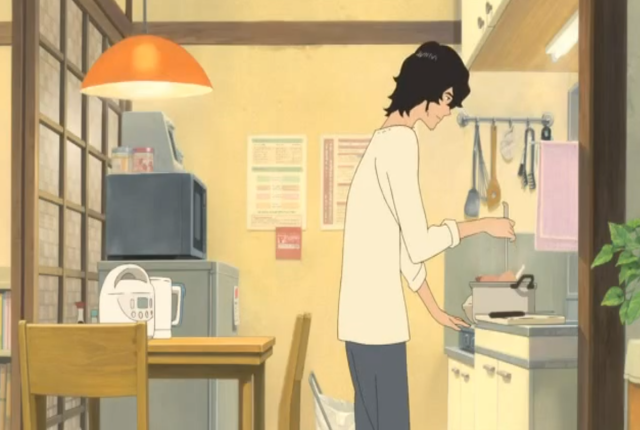
Fuente: Screenshot de la película.
Luego del nacimiento de su segundo hijo, Ame, tristemente fallece el padre mientras buscaba cazar comida para sus hijos.
La vida como madre soltera se vuelve una cuesta arriba, entre los vecinos, los dueños del edificio y los de servicios sociales, con una niña tan hiperactiva como Yuki y un bebé tan inquieto como Ame.
Sin dejar nunca su sonrisa de lado, decide mudarse al campo donde con sus lejanos vecinos aprende a ser parte de la comunidad.
A medida que los niños crecen las dificultades cambian, la necesidad por socializar, por tomar un camino crece, ambos niños deben tomar su propio destino.
Hana como toda madre procura hacer siempre lo mejor para sus hijos, criarlos y cuidarlos de la mejor manera, cosa que logra y se afirma casi al final de la película “has criado a ambos niños en individuos seguros que han escogido por si mismos el camino de su vida”.
The first thing that stands out is that the film is told in retrospective, from a third point of view.
In the first few minutes we meet Hana, a college girl, and a young worker (Ookami; whose name isn't revealed in the film), who poses as a student.
They quickly start a friendship that turns into a relationship, driven by trust and love for the girl, he confesses to her his secret "being a werewolf".
Hana's family love dominates her feelings and leads her to abandon college studies and devote herself to her family, who become a small nucleus of four members.
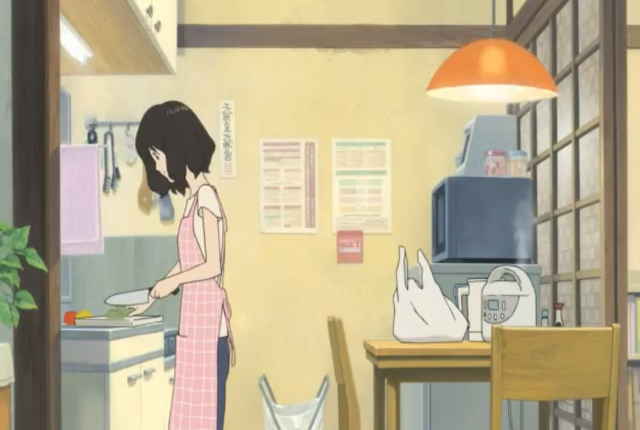
Source: Screenshot of the movie.
After the birth of her second child, Ame, her father sadly passes away while hunting for food for his children.
Life as a single mother becomes an uphill climb, between neighbors, building owners and social services, with a child as hyperactive as Yuki and a baby as restless as Ame.
Never letting go of her smile, she decides to move to the countryside where, with her distant neighbors, she learns to be part of the community.
As the children grow up the difficulties change, the need to socialize, to take a path grows, both children must take their own destiny.
Hana as every mother tries to always do the best for her children, to raise and care for them in the best way, which she achieves and it is stated almost at the end of the film...
"you have raised both children into confident individuals who have chosen for themselves the path of their life".
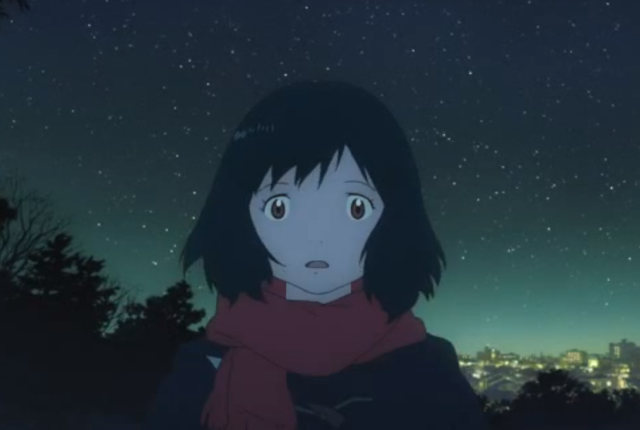

💭 | Reflexión | Reflection | 💭
Tengo mucho que opinar de esta película jeje, así que espero me disculpen si me extiendo un poco.
1.- La animación japonesa siento que tiene una orientación marcada por el sentimentalismo, las lecciones de vida y la reflexión, esta obra me hace ver una decisión de “¿qué quieres hacer con tu vida?”, más allá de lobos y humanos.
2.- El hilo principal de esta obra siento que es el amor, pero uno familiar, incondicional y sereno que busca lo mejor para el otro. No solo entre madre e hijos, sino también entre vecinos, amigos de escuela y maestros.
2.1.- La maternidad que presenta este filme me parece real y original, que a veces me divierte, en una de las escenas a Hana se le plantea a dónde llevar a sus hijos cuando enferman ¿veterinario o pediatra?
2.2.- La lucha por salir adelante con sus hijos lleva a Hana, a aprender, a estudiar, a crecer con ellos, y finalmente a soltar, a dejar que los niños tomen su propio camino, confiando en haber hecho lo mejor posible.
3.- La sencillez de la obra puede jugarle en contra, siento que a veces se pasa de común o simple, pero creo que allí esta su punto. Aunque no me guste, puede ser el punto que a otra persona le encante.
4.- La búsqueda de la identidad en todos los personajes es vuelve un elemento precioso; el paso de estudiante a madre de Hana, el crecimiento de Yuki en su marcada socialización y la decisión de Ame hacia algo que antes no le gustaba, hace esta obra maravillosa.
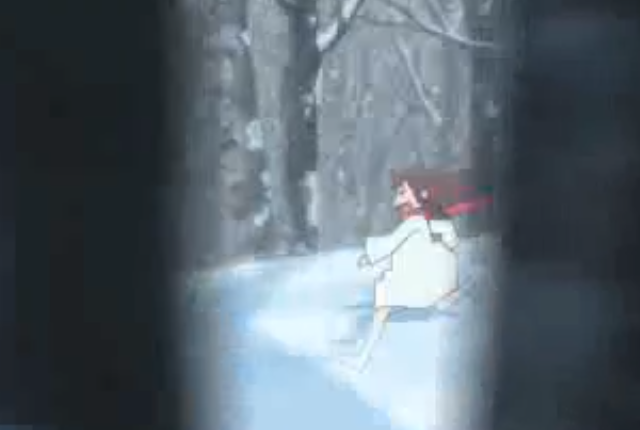
Fuente: Screenshot de la película.
5.- Es fácil identificarse con cualquiera de nuestros protagonistas, como hija me fue sencillo identificar factores comunes entre Yuki o Ame y yo. Me encantaría saber qué opina una madre sobre este filme.
El ritmo de la película me parece adecuado al estilo que nos presentó desde el principio, así que esas casi dos horas no se vuelven tediosas porque lleva una constante marcada por la serenidad.
La música me parece asombrosa, en ocasiones me sumergía tanto en la película que cuando me daba cuenta el acompañamiento musical se fundía en el ritmo del filme.
I have a lot to say about this movie hehe, so I hope you'll excuse me if I go on a little long.
I feel that Japanese animation has an orientation marked by sentimentality, life lessons and reflection, this work makes me see a decision of "what do you want to do with your life?, beyond wolves and humans.
2.- The main thread of this play I feel is love, but a familiar, unconditional and serene one that seeks the best for the other. Not only between mother and children, but also between neighbors, school friends and teachers.
2.1.- The maternity presented in this film seems to me real and original, and sometimes it amuses me, in one of the scenes Hana is asked where to take her children when they get sick, a veterinarian or a pediatrician?
2.2.- The struggle to get ahead with her children leads Hana to learn, to study, to grow with them, and finally to let go, to let the children take their own path, confident that she has done her best.
3.- The simplicity of the work can play against it, I feel that sometimes it is too common or too simple, but I think that's its point. Even if I don't like it, it may be the point that someone else will love it.
4.- The search for identity in all the characters becomes a precious element; Hana's passage from student to mother, Yuki's growth in her marked socialization and Ame's decision towards something she didn't like before, makes this work wonderful.
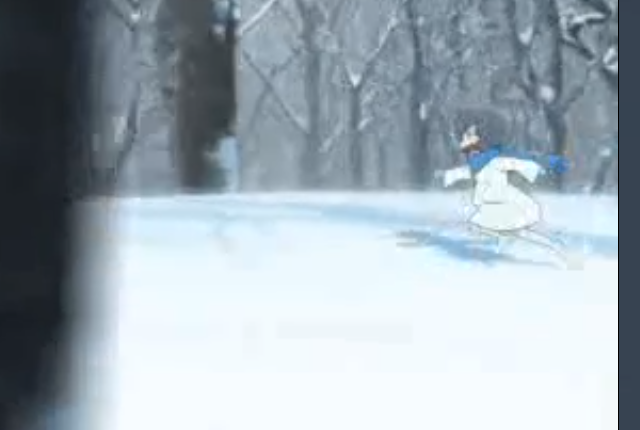
Source: Screenshot of the movie.
5.- It is easy to identify with any of our protagonists, as a daughter it was easy for me to identify common factors between Yuki or Ame and myself. I would love to know what a mother thinks about this film.
The pace of the film seems to me adequate to the style it introduced us to from the beginning, so those almost two hours don't become tedious because it carries a constant marked by serenity.
I find the music amazing, at times I was so immersed in the film that when I realized the musical accompaniment melted into the rhythm of the film.

🤗 | Conclusión | Conclusion | 🤗
Mamoru Hosoda no es Miyazaki ni Shinkai, así que finalizaré mis reflexiones partiendo de este punto. Si bien este último ha dejado un estándar alto para las películas de animación japonesa, no está bien menospreciar el resto de obras maestras que cada año emite este país.
Hosoda nos ha dejado bien claro su estilo tranquilo, con calma, sensible y reflexivo de sus obras, recuerdo con mucho cariño “La chica que saltaba a través del tiempo” por la hermosa creación.
La posibilidad de análisis de esta película no es para verla una sola vez, la vi dos veces y siento que aún me falta tanto por descubrir de esta película.
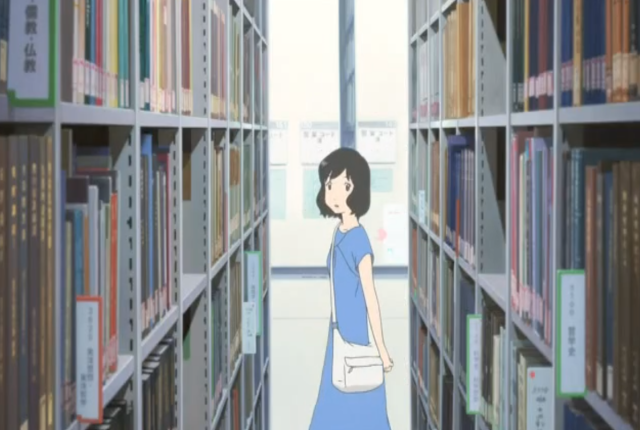
Fuente: Screenshot de la película.
Al pensar en algunas metáforas que asoma el filme me hace tener la piel de gallina al escribir este texto.
Y si la tormenta del final que marca las decisiones de sus hijos representa el interior de una madre abrumada, preocupada y angustiada por la insuficiencia que se calma con una voz de paz que dice “lo has hecho bien”.
La decisión de los niños más allá de lobos y humanos, se vuelve para el espectador una reflexión de si nos aceptamos nosotros mismos, aceptamos nuestros ascendentes familiares, ser de determinada profesión solo por nuestro padre o tomar nuestro propio camino.
¿Dañar una oreja para que no escuche, por no ser escuchado o para no escuchar? Una pregunta que revuelve las entrañas de quien piense en la voz narrativa de la película.
Me encantaría encontrar respuesta a estas reflexiones, pero sin duda alguna, están allí para dejarte pensando. Les invito totalmente a verla, así como yo fui invitada.
Disfruté demasiado los escenarios, la música y la narración, sin embargo, no me sentía en la película, personalmente disfruté la sencillez, pero tal vez fue demasiado.
En mi opinión, será 9 puntos de 10.
Mamoru Hosoda is not Miyazaki or Shinkai, so I will end my reflections on this point. Although the latter has set a high standard for Japanese animated films, it is not right to underestimate the rest of the masterpieces that this country releases every year.
Hosoda has made his quiet, calm, sensitive and thoughtful style of his works clear to us, I fondly remember "The Girl Who Leapt Through Time" for the beautiful creation.
The possibility of analysis of this film is not to see it only once, I saw it twice and I feel that I still have so much to discover about this film.
Thinking about some of the metaphors that the film brings up makes me have goosebumps while writing this text.
And if the storm at the end that marks the decisions of their children represents the interior of an overwhelmed mother, worried and anguished by the inadequacy that is calmed by a voice of peace that says "you have done well".
The children's decision beyond wolves and humans, becomes for the viewer a reflection of whether we accept ourselves, accept our family ascendants, be of a certain profession only because of our father or take our own path.
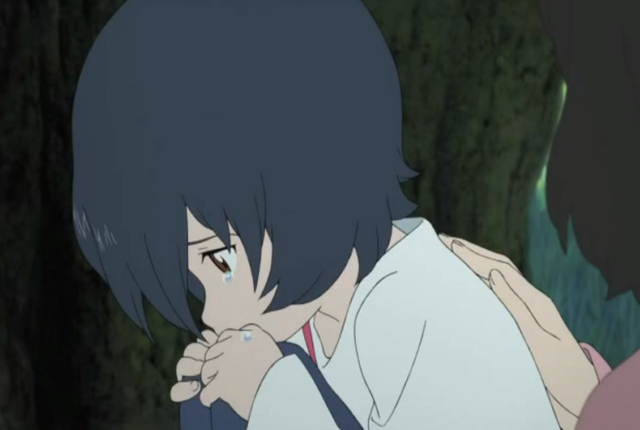
Source: Screenshot of the movie.
- To damage an ear not to listen, not to be heard or not to listen at all? A question that stirs the guts of anyone who thinks about the narrative voice of the film.
I would love to find answers to these reflections, but they are certainly there to leave you thinking. I totally invite you to see it, just as I was invited.
I enjoyed the scenery, music and narration too much, however, I didn't feel like I was in the movie, I personally enjoyed the simplicity, but maybe it was too much.
In my opinion, it will be 9 points out of 10.
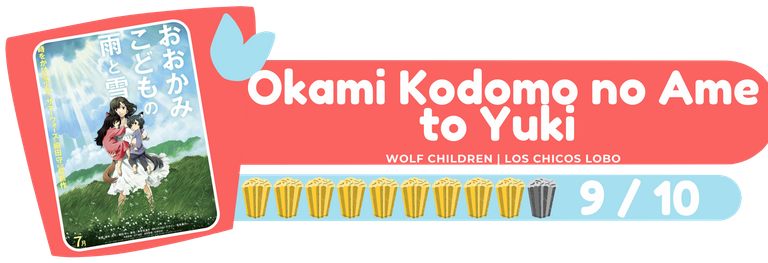
¡Muchas gracias por acompañarme en el tercer Lunes de Películas! Espero que puedan darle una oportunidad a estas películas o si ya la vieron comentarme sus opiniones.
Estoy pensando en agregar una sección para analizar a los personajes principales, me gustaría leer alguna opinión sobre esto porque siento que volvería más larga o tediosa la review.
Aún no tengo película para la semana que viene, así que, si gustan recomendarme alguna, ¡siempre es bienvenida!
Thank you very much for joining me on the third Movie Monday! I hope you can give these movies a chance or if you have already seen them, let me know what you think.
I'm thinking about adding a section to analyze the main characters, I would like to read some opinions about this because I feel it would make the review longer or tedious.
I still don't have a movie for next week, so, if you like to recommend any of them, it's always welcome!


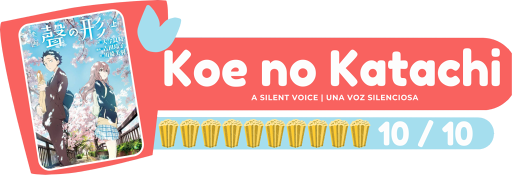
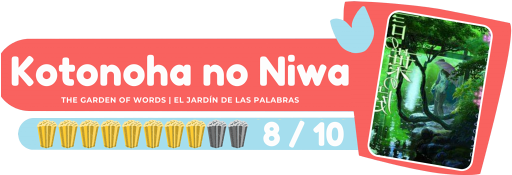
Me alegra que te haya gustado la peli, una de mis favoritas, me llenó de nostalgia y el planteamiento tan parecido a la vida real me hace crear lazos de conexión, sin duda una obra que merece más reconocimiento. Gracias por tu lunes de película, si logro decidirme por una recomendación de película más, regresaré para dartela, un fuerte abrazo <3
Es una película muy bonita sobre todo en la animación, a mi me encanta 😍 Espero poder leerte de nuevo, me gustó mucho tu forma de redactar.
Muchísimas gracias! Me alegro mucho que te haya gustado, espero verte el siguiente lunes! Un abrazo!
Holaaaa! de verdad que no espere que por lo que decías de la sinopsis fuera algo tan reflexibo. Pero bueno esa es una de las cualidades de la gran mayoría de peliculas animadas (tanto de Asia, como de cualquier lado). Creo que en cuanto tenga un chance iré a verla!!
Saludooos
Yo tampoco me lo imaginaba, tremenda sorpresa me llevé, espero que también te guste! Gracias por tu comentario, un abrazo!
Que genial!! Ya me dieron ganas de verla. Me gustan mucho esas películas japonesas que despiertan esas emociones tan bonitas 😊😍
Nos agradó mucho la forma tan personal en que reflexionaste sobre este film. Japón, ciertamente, produce series y películas muy humanas y profundas. ¡Gracias por compartirla y por compartirnos tu visión! 😊😊
Muchas gracias a ustedes por leerme, es un gusto compartir mi opinión! Espero leerlos pronto en otro post!